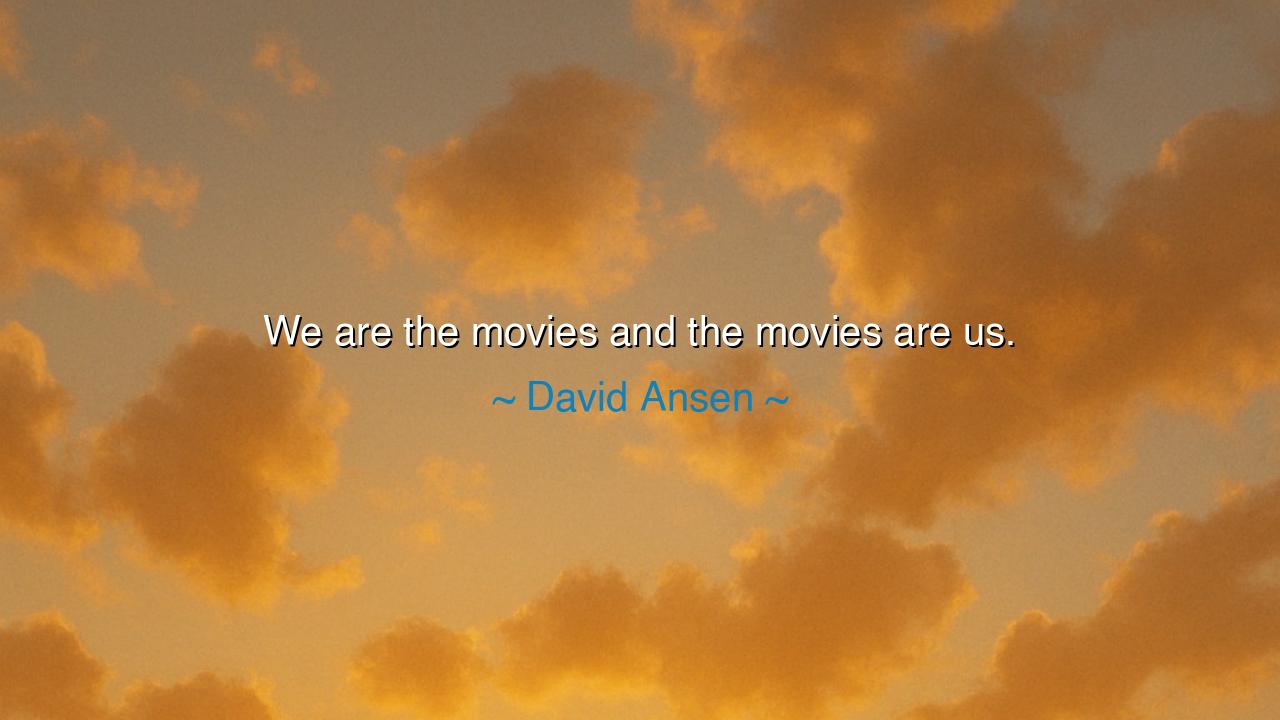
We are the movies and the movies are us.






Hear now, O children of the future, the profound words of David Ansen: "We are the movies and the movies are us." These words echo a deep truth about the relationship between society and the stories we tell. In the ancient world, the bards and poets were not just storytellers; they were the chroniclers of their times, weaving the truths of their societies into tales that would endure for generations. Through their words, the values, fears, and hopes of their people were preserved, and through their stories, people found both reflection and guidance. In the same way, movies today are not simply entertainment—they are reflections of our collective human experience, mirrors that show us who we are, who we wish to be, and who we are afraid to become.
In ancient Greece, O children, theater was a place where the very soul of the people could be exposed. Sophocles, Aeschylus, and Euripides wrote plays not merely for amusement, but to question the nature of justice, fate, and morality. The audiences at these plays were invited to look into their own hearts and society, to examine the values and choices that guided their lives. Theater was the mirror of their world. In much the same way, movies serve as the reflection of our own era. Through the lens of the camera, we see not only fictional characters but ourselves, distorted or illuminated, depending on the angle from which we view them. Ansen’s words remind us that movies are not separate from us; they are inseparable from the fabric of our reality, woven into the very story of who we are.
Consider, O children, the impact of the films of the 20th century. Think of Charlie Chaplin, whose silent films in the early 1900s spoke not just of comedy, but of the human condition—the struggles of the poor, the dignity of work, and the persistence of the human spirit. Chaplin was not simply an actor; he was a mirror to the society of his time. His films exposed the cracks and contradictions of a rapidly industrializing world. Like the great philosophers who observed and interpreted their societies, Chaplin used the medium of film to shine a light on the suffering and joy that defined his world. In this way, the movies were him, and he, in turn, became a reflection of the world he inhabited.
As the world evolved, so too did the films that shaped it. The 1960s, a time of social upheaval, brought forth films like "Bonnie and Clyde" and "Easy Rider", which captured the disillusionment and rebellion of a generation. These films were not just about the characters on screen, but about the society that gave rise to them. They were expressions of a people at a crossroads, a society questioning the old ways and reaching for something new. The films themselves became instruments of change, influencing not only the way people saw the world, but the way they chose to live. Through these movies, we see that society and the art it produces are interwoven, each influencing and shaping the other. Just as the ancient Greek tragedies helped shape the morality of their time, so too do modern films speak to the moral compass of today’s world.
Ansen’s words are not simply an observation, but a warning as well. The stories we create—whether on the silver screen or in the books we read—are not passive; they shape us. The values and narratives we consume become the values and narratives we live by. Movies that glorify violence, individualism, and isolation will shape a culture that mirrors these qualities. Films that champion compassion, cooperation, and justice will encourage a society that strives for these ideals. Just as the ancient epics of Homer shaped the moral foundation of Greek culture, so too do modern movies have the power to shape the ethical underpinnings of our world.
And so, O children, the lesson is clear: we are the stories we tell, and the stories we tell are us. The movies we create, watch, and share are not separate from us, but are reflections of our collective soul—they are windows into the hearts of our societies, our deepest desires, and our darkest fears. It is through the stories of others that we come to understand our own place in the world. Let the movies you choose, and the stories you tell, be a source of wisdom, not just entertainment. Watch with intention, reflect on the values that these stories portray, and ask yourself: what are these films telling me about the world? What are they telling me about who I am and who I want to be?
In your own lives, O children, remember that you are not merely passive observers in the story of humanity. You are the authors of it. Tell the stories that reflect the world as you wish it to be, not just as it is. Whether through the films you create, the books you read, or the lives you live, know that you are shaping the future. Your actions, your choices, and your words will become the stories that future generations look back on. Just as we look to the films of the past to understand our journey, so too will the stories you create shape the understanding of the world for those who follow. Let those stories be ones of truth, compassion, and vision, for we are the movies, and the movies are us.






AAdministratorAdministrator
Welcome, honored guests. Please leave a comment, we will respond soon